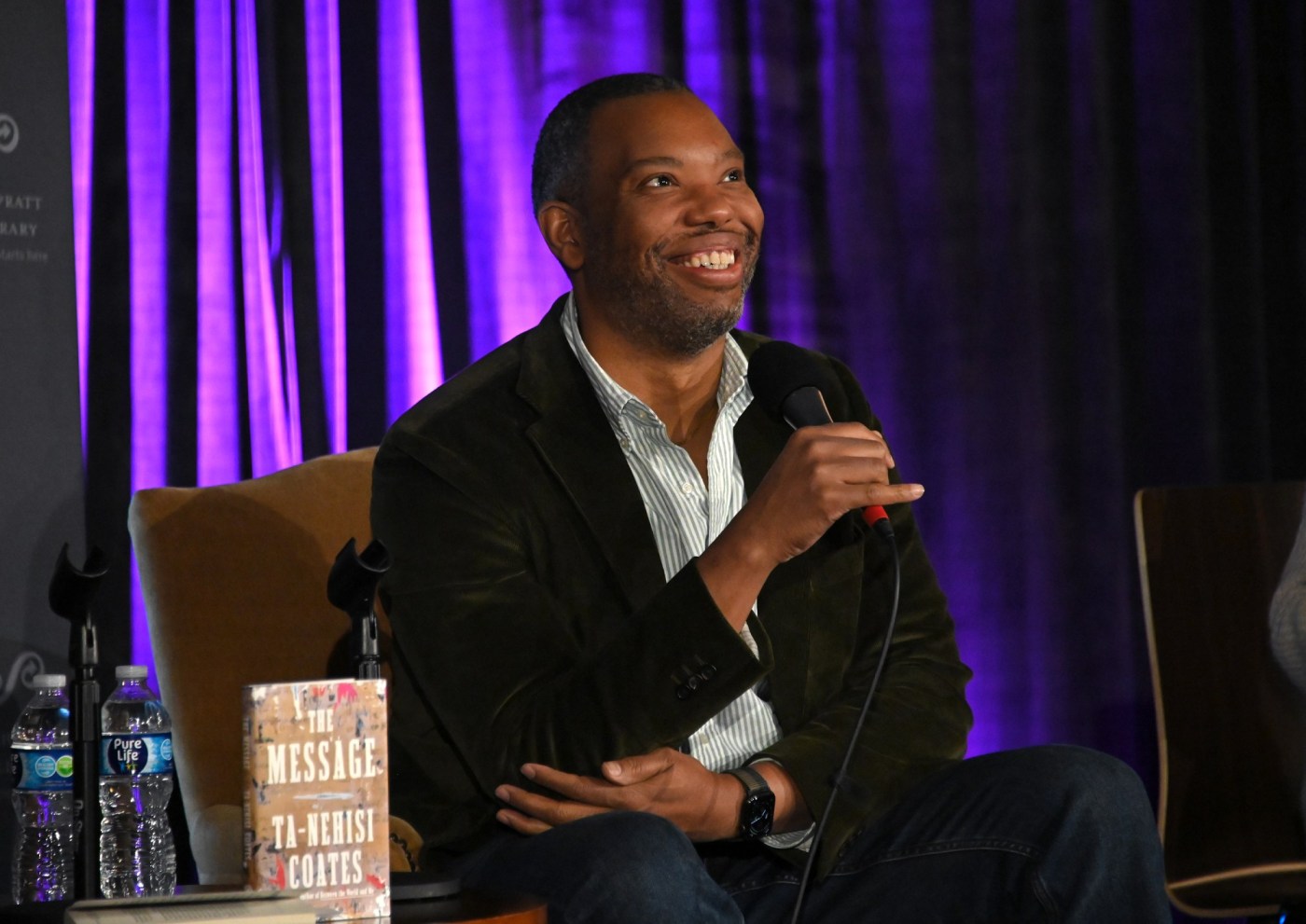
Ta-Nehisi Coates condemns Israel’s ‘oppression’ of Palestinians in new book
The acclaimed Baltimore born writer Ta-Nehisi Coates took the stage at the Enoch Pratt Free Library at 7 p.m. Wednesday — minutes after the sunset start of the Jewish high holy day of Rosh Hashana — to denounce what he describes in his new book as Israel’s “ethnic cleansing” of Palestinians living in the occupied territories.
Coates didn’t mention the holiday during his appearance before an overflow crowd of 600 at the library’s Central branch, where he discussed “The Message” with moderator Tom Hall, host of “Midday” on WYPR-FM.
But the author referred obliquely to the 2023 attack by the Palestinian group Hamas on southern Israel that took more than 1,100 lives — an assault that the group said was in retaliation for Israeli atrocities against Palestinians. The one-year anniversary of the attack is Monday. Hamas has been designated as a terrorist organization by the United States, Canada and the European Union.
“The horrors of Oct. 7 cannot be diminished,” Coates, 49, said. “I wish we were also interested in the horrors of Oct. 6 in Gaza.”
His essay about Israel and Palestine, which makes up a bit more than half of “The Message,” doesn’t mention the yearlong conflict that erupted after last fall’s surprise attack. But Coates said that during his 10-day trip to the Middle East in May 2023, he observed “what was probably the most visceral oppression [of Palestinians] that I’ve ever witnessed in my life.”
Responding to a question from The Sun about the scheduling of Coates’ appearance, library system spokeswoman Meghan McCorkle wrote in an email that the timing of the reading to coincide with one of the holiest days on the Jewish calendar was “an unfortunate coincidence.”
She added: “Coates is on a book tour and October 2 is the only day he is in Baltimore. … We are beholden to their tour schedule when we book large authors and we haven’t had the opportunity to host him in nearly a decade.”
The remaining two essays in “The Message” delve into what Coates believes to be two other oppressive systems: in Senegal, where the author tours a site of the former transatlantic slave trade, and in South Carolina, where he visits a school that has banned his National Book Award-winning “Between the World and Me.”
But Coates is at his most passionate when writing about Israel and Palestine. Though the book has been out for not quite two days, it’s already generating pushback.
During an appearance Monday on “CBS This Morning” host Tony Dokoupil said that if “The Message” had been written by any author less well-known than Coates, it would be considered an “extremist” tract.
“Is it because you just don’t believe that Israel, in any condition, has a right to exist?” Dokoupil asked, eliciting a forceful response from Coates and leading to accusations online that the TV host and Severna Park High School graduate was being harshly critical because of his family ties to Israel.
In “The Message,” Coates sees striking similarities between the American system of slavery before the Civil War, and the plight of the Palestinians in 2024.
[]
This essay includes references to “Jim Crow laws” and “the perpetual process of ethnic cleansing.” The term “apartheid” is mentioned more than once, and so is “colonization.”
As Coates put it during Wednesday’s discussion: “This is a country in which half the population are fully enshrined and invested citizens, and the other half are varying tiers of something less. That is not democracy.
“You have one group of people living in one place and subject to the civil justice system with all its rights and privileges and assumption of innocence. And then you have another group of people subject to the military justice system where you can be arrested, and no one has to tell your family what you’re charged with.
“What is moral about that?”
“The Message” was released Tuesday by One World Publications.
Howard Libit, executive director of the Baltimore Jewish Council, said in a written statement to The Sun that Coates’ book “puts forth a false and dangerous portrayal of Israel and Jews.”
Scheduling Coates’ appearance to coincide with one of the holiest periods on the Jewish calendar, Libit said, adds insult to injury.
“It is —at best – insensitive to Baltimore’s Jewish community” he wrote, and added: “The Enoch Pratt Library should be more careful to present proper context and consider the timing of such programs so as to ensure that all people who are vested in the subject matter can attend.”
Coates’ Palestine essay begins with the author’s visit to the World Holocaust Remembrance Center in Jerusalem.
The author has said that he wrote the essay to explore the question of how victims can turn into victimizers — a topic that led to his uncomfortable speculations about what might have happened if the late Marcus Garvey had achieved his dream of establishing a unified Africa with a legal code that guaranteed Black racial purity.
Coates wondered whether Garvey’s followers — many of whom had endured and overcome a lifetime of oppression — would eventually have concluded that participating in some ethnic cleansing of their own was necessary for their survival.
But while Israel takes a shellacking in Coates’ book, the author also takes himself, his own writing, and his homeland to task.
For instance, “The Case for Reparations,” the 2014 essay that catapulted Coates into the national consciousness and established his credentials as a public intellectual, makes him wince inwardly when he re-reads it now.
That essay includes a long section suggesting that the 3 billion marks that Germany paid to Israel as reparations for the Holocaust is an example that the U.S. might follow.
But Coates believes now that his analysis of Israel in the 2014 essay was superficial and deeply flawed — a consequence of his not having visited the country he wrote about.
“Communicating with clarity comes from touching things and going places,” he said. “Your brilliance and your genius cannot compete with actual, direct experience.”
The author also blames the U.S. for, in his words, “subsidizing apartheid.”
“This is 100% our fault,” Coates said.
“It is not just that we provide the 2,000-pound bombs that you’ve heard about. But every single fighter jet that drops those bombs comes from America. The 2% of the population of the Gaza Strip that has been wiped out would not be possible without the United States.
“This is our war. This is our genocide.”
As Coates concluded his remarks, the crowd rose to its feet in a standing ovation.
Got a news tip? Contact reporter Mary Carole McCauley at mmccauley@baltsun.com, 410-294-0169 or @mcmccauley on X.

